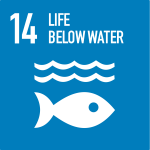Sea Surface Temperature (SST) influences weather, including hurricanes, as well as plant and animal life in the ocean. Like Earth’s land surface, SST is warmer near the equator and colder near the poles. The five-year average of SST data allows us to visualize the temperature pattern of the sea in Malaysia covering different marine ecoregions. And by comparing the time series average differences, we can compare the rate of temperature changes. The data allows us to identify the region that has the highest temperature increment for further empirical investigation in relation to marine ecosystems in the Anthropocene.
The SST has shown a significant upward trend expanding from the coast to open sea with overall average increment of ±0.24 °C from 29.31 °C (2003-2007) to 29.56 °C (2018-2022) in the Malaysia marine ecoregions. The increment indicates a warmer sea surface temperature attributed to a combination of factors, including the enhanced greenhouse effect.
The sea surface temperature, SST data is derived from radiance measurements collected by the Moderate Resolution Imaging Spectroradiometer (MODIS) instruments aboard NASA’s Terra and Aqua satellites. The dataset comprises sea surface temperature (SST) information represented as a CSV format with three columns: x-coordinate, y-coordinate, and corresponding sea surface temperature, °C value.
| TEMPORAL COVERAGE | : | 1-Jan-2003 to 31-Dec-2022 |
| TEMPORAL FREQUENCY | : | 5 years average |
| SPATIAL COVERAGE | : | Malaysia, with extent of 95.959o W, 0.819o S, 121.061o E, 10.263o N |
| SPATIAL RESOLUTION | : | 0.1° |
| VARIABLES | : | Sea Surface Temperature (°C), 5 years average |
Yu Hai Ping (2023). Five-Years Time Series Averages and Differences (2003-2007 vs 2018-2022) of Sea Surface Temperature, SST in Malaysia. Institute of Climate Change, UKM. MyIKLIM database. Available online: https://myiklimysd.ukm.my/stsh_002_ikl/ [accessed on: enter date]
| CONTACT PERSON | : | Yu Hai Ping, haiping0516@hotmail.com |
| FUNDING INFORMATION | : | Research on Symbiodiniaceae diversity in Malaysia hosted by single host species and its correlations with environmental variations, supported by Fundamental Research Grant Scheme (FRGS). |
| REFERENCE | : | NASA/JPL. (2020). GHRSST Level 2P Global Sea Surface Skin Temperature from the Moderate Resolution Imaging Spectroradiometer (MODIS) on the NASA Aqua satellite (GDS2) [Data set]. NASA Physical Oceanography DAAC. https://doi.org/10.5067/GHMDA-2PJ19 |






